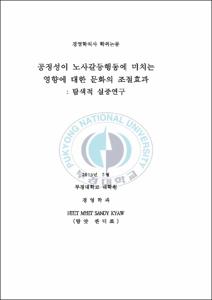공정성이 노사갈등행동에 미치는 영향에 대한 문화의 조절효과: 탐색적 실증연구
- Alternative Title
- A Study on Moderating Effect of the Culture on the Effect of the Justice on the Misbehavior: Exploratory Empirical Study
- Abstract
- Abstract
The purpose of this study is to examine moderating effect of the culture on the effect of the justice on the misbehavior empirically.
This study included independent variables such as distributive justice, procedural justice and interpersonal justice, dependent variables such as interpersonal misbehavior, production misbehavior, property misbehavior and political misbehavior, and moderating variables such as Hofstede’s cultural dimensions(individualism, power distance, masculinity, uncertainty avoidance and long-term orientation).
The data for empirical study is collected from the survey on a sample of 309 employees in Myanmar and Korea. And a hierarchical regression analysis was conducted to examine the moderating effect of cultural dimensions on the effect of justice on misbehavior.
The result of empirical test is as follows. First, hypothesis 1 is partly accepted. There is significant negative effect of distributive justice on interpersonal, production and political misbehavior.
Second, hypothesis 2 is partly accepted. There are significant but different moderating effects of Hofstede’s cultural dimensions(without uncertainty avoidance) on the effect of the justice on the misbehavior. The more individualism is high, the more the effect of the distributive justice on interpersonal, production and political misbehavior is higher and the effect of the procedural and interpersonal justice on property misbehavior is high. The more power distance is high, the more the effect of the distributive justice on interpersonal, production and property misbehavior and the effect of the procedural justice on political misbehavior are high. The more masculinity is high, the more the effect of distributive justice on interpersonal and production misbehavior is high. The more long term orientation is high, the more the effect of procedural justice on interpersonal, production and political misbehavior is high and the effect of interpersonal justice on interpersonal misbehavior is low.
Based on results of the empirical study, managerial implications that there are needs of different human resource(HR) systems for management of justice in organization according to laborer’s (dimensions of)culture.
Lastly limitations of this study and directions for future study were suggested.
- Issued Date
- 2015
- Awarded Date
- 2015. 2
- Type
- Dissertation
- Publisher
- 부경대학교 경영대학원
- Alternative Author(s)
- 탐얏싼디쬬
- Affiliation
- 경영대학원
- Department
- 대학원 경영학과
- Advisor
- 윤영삼
- Table Of Contents
- 목 차
Abstract vi
제1장 머리말
제1절 연구의 배경과 목적 1
제2절 연구의 방법과 체계 2
제2장 이론적 배경
제1절 공정성과 노사갈등행동
1. 공정성 3
2. 노사갈등행동 5
제2절 문화와 Hofstede의 문화론 8
제3절 공정성이 노사갈등행동에 미치는 영향 14
제4절 공정성이 노사갈등행동에 미치는 영향에 대한 문화 의 영향 17
제3장 실증연구의 가설 및 방법론
제1절 연구모형과 연구가설 19
제2절 변수의 조작적 정의와 설문문항 22
제3절 표본과 통계분석방법 24
제4절 변수의 타당도와 신뢰도 분석결과 26
제4장 실증분석결과
제1절 기술통계 분석결과 29
제2절 가설검증 결과
1. 가설 1의 검증 결과 30
2. 가설 2의 검증 결과 32
제3절 해석과 토의 44
제5장 맺음말
제1절 연구결과의 요약 45
제2절 연구결과의 시사점 46
제3절 연구의 한계와 향후연구의 방향 47
참고문헌 48
[부록 1] 국가(미얀마와 한국)의 조절효과 분석결과 52
[부록 2] 미얀마와 한국의 변수별 평균 비교결과 54
[부록 3] 미얀마와 한국의 표본을 대상으로 한 분석결과 요약 57
[부록 4] 설문지 58
- Degree
- Master
- Files in This Item:
-
-
Download
 공정성이 노사갈등행동에 미치는 영향에 대한 문화의 조절효과: 탐색적 실증연구.pdf
기타 데이터 / 832.45 kB / Adobe PDF
공정성이 노사갈등행동에 미치는 영향에 대한 문화의 조절효과: 탐색적 실증연구.pdf
기타 데이터 / 832.45 kB / Adobe PDF
-
Items in Repository are protected by copyright, with all rights reserved, unless otherwise indicated.